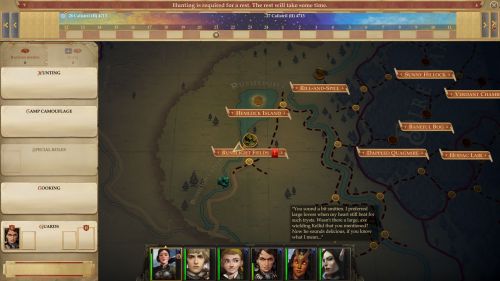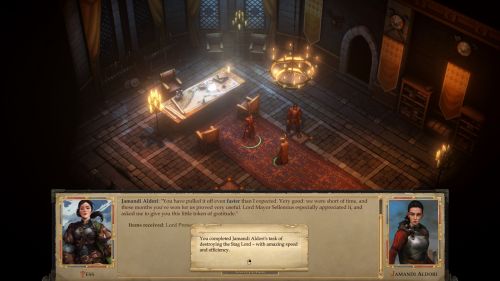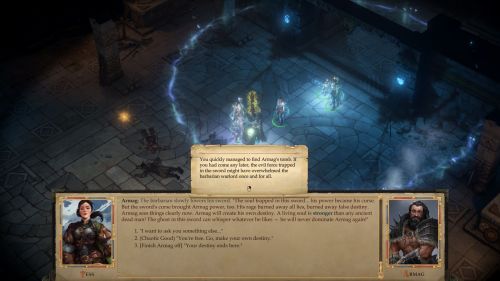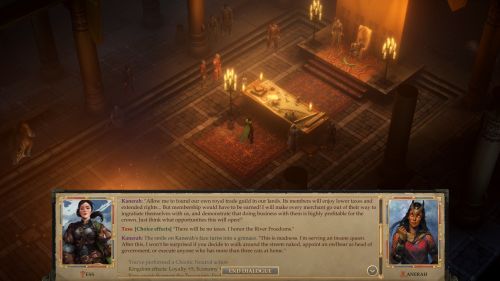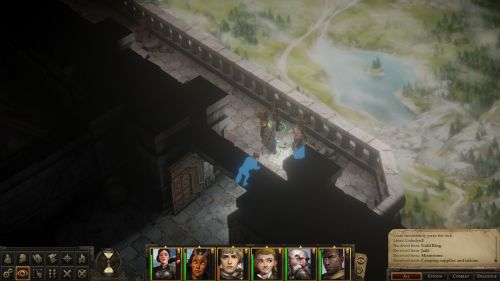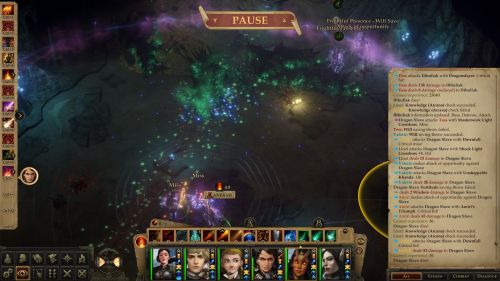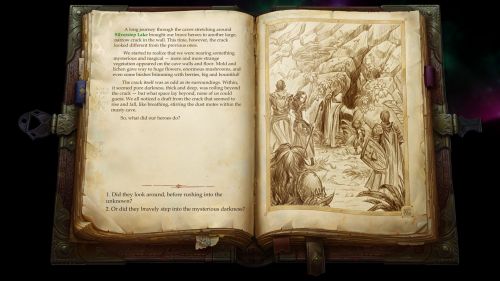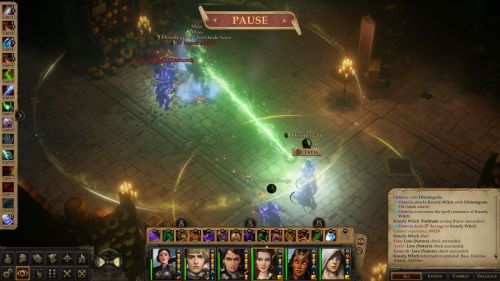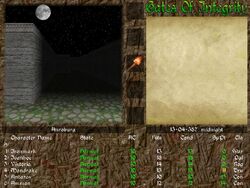RPG Codex Review: Pathfinder Kingmaker
RPG Codex Review: Pathfinder Kingmaker
Codex Review - posted by Infinitron on Sun 23 August 2020, 16:21:45
Tags: Owlcat Games; Pathfinder: KingmakerWhy did it take us so long to review Pathfinder: Kingmaker, our RPG of the year for 2018? Maybe it's because the game isn't good in a particularly interesting way - merely a well-executed visit to the not-Forgotten Realms. Or maybe it's because applying the kind of exhaustive analysis we value here to its implementation of the already familiar 3rd Edition ruleset would just be too much work for too little payoff. Whatever the case, we have recently appointed Codex staff member Roguey to thank for finally putting in the effort and filling this gap in our portfolio. Here's an excerpt from his review, including its approving conclusion:
Read the full article: RPG Codex Review: Pathfinder Kingmaker
Kingmaker has a gated open structure; you're able to explore anywhere you want in a certain region, but there are various plot gates that keep you from entering other higher level regions until another chapter unlocks them. I'm not one for high risk, high reward sequence breaking, so I don't mind. As for the main quest, it has to be followed in a step by step manner, though sometimes you'll be able to unlock a new area early if your perception is high enough. Even with these limits, choosing a direction to go in without knowing where the path will take you or what new locations will pop up really helps sell the idea that you're taming an untamed land.
Moreover, one novel aspect of the campaign is that once you've been given your barony, the NPCs come to you with their problems rather than the opposite. Sure, there are some sidequests to pick up while exploring the world, but for the most part, you'll be given the details of your quests from your throne room. A potential downside for some is that this means there is no part where you explore a big city looking for errands to run for random citizens, which is an expectation many fantasy RPG fans have; this would be inappropriate for someone of your character's station. It's eccentric enough to go around solving your people's issues personally, which some NPCs do observe with amusement.
I hope you like combat because Kingmaker has a ton of it. Too much in fact; combat areas on the critical path regularly have 10-12 encounters per map which feels like twice as much as there should be, especially since several areas contain multiple maps. In an interview conducted with us before his cognitive decline, Obsidian's Josh Sawyer said "Sometimes as a designer, when you look at a screen, and you realize like 'Wow, there's nothing there, oh I gotta put something there,' but it's okay. Or maybe that thing that you put there is like a container, or it's something to harvest, or just a little thing. The important thing is that it changes; it can't just be a fight, a screen, and a fight," which is advice Owlcat really ought to take.
Even if there are too many battles, I do like the pacing of combat difficulty for the most part, which consists of a mix of easy to medium and easy to hard battles on every map. Nearly every optional area has just a single encounter of medium or hard difficulty for its intended level, which is a welcome relief from the main quest, though the small number of maps available and the constant recycling of them will become quickly apparent. There are a few optional areas which contain something more substantial; I didn't care for the dungeon where you're locked in and have to kill skeletons over and over again until you're let out, but I loved the area where you climb a mountain to a fortress to kill a giant bird and take its egg (to deliver to an innkeeper or to keep for a one-use-only long-term buff recipe that will give you +3 to attack, damage, skill checks, and saving throws).
There are a handful of quests without combat at all, which is another welcome relief. The most memorable of these involve throwing a party for a sad companion, participating in some other-worldly debates, and competing in a series of contests at a festival. I enjoyed the comedic writing in all of them. Some areas have optional and mandatory puzzles to solve; I have a mixed opinion on these, though my favorite involved a dungeon in chapter three where you have to leave companions behind to press switches to open and close doors. There are also quite a number of well-done illustrated text adventures, which have seemingly become a standard feature in pseudo-isometric fantasy RPGs much to my approval.
When it comes to consistency, Kingmaker is a mix of fun and frustrating. I found the first two chapters a near-relentless grind with enough good parts to keep me going. While I hated the railroading in chapter three, it did ease up a bit. Chapter four was my favorite; unsurprisingly, it's also the shortest. I also loved chapter five up until the final combat area which is a grind of 18 combat encounters in a single map, with half of them tuned to make you give your all. Chapter six eases back a bit, while keeping the difficulty (Mandragora swarms are the cazadores of Kingmaker; I'll let you discover how for yourself). I'm grateful that most of the combat encounters in the final dungeon are off the critical path, so I only had to fight around ten, which may seem like a lot, but the dungeon is three maps with two world states each for a total of six with far more to kill than that. It's my understanding that Owlcat reconfigured the encounters in response to feedback, so props to them. There's even an optional bonus chapter after that depending on a decision you can make, but I didn't play it because I was completely satisfied with the ending I received thanks to my earlier actions; moreover, after 112 hours, I had more than enough, especially after glancing at the massively debuffed conditions you're expected to play under. I'll leave it to the powergamers.
[...] Flawed as it may be, Kingmaker is high enough in quality when it comes to core gameplay and content. My congratulations to Owlcat for making a rough diamond on their first try after many months of patches. While it has too many issues to be an indisputable classic, this is the game Neverwinter Nights 2 should have been, and the one Pillars of Eternity failed to be (even though PoE has better combat pacing even with all its encounters). It's too bad it goes overboard on combat to such a degree that it's the equivalent of two RPGs in one; I never want to play it again even though I'd normally want to try a different build and make different choices. Nevertheless, it's a must-play for any real-time-with-pause party-based fantasy RPG fan.
Moreover, one novel aspect of the campaign is that once you've been given your barony, the NPCs come to you with their problems rather than the opposite. Sure, there are some sidequests to pick up while exploring the world, but for the most part, you'll be given the details of your quests from your throne room. A potential downside for some is that this means there is no part where you explore a big city looking for errands to run for random citizens, which is an expectation many fantasy RPG fans have; this would be inappropriate for someone of your character's station. It's eccentric enough to go around solving your people's issues personally, which some NPCs do observe with amusement.
I hope you like combat because Kingmaker has a ton of it. Too much in fact; combat areas on the critical path regularly have 10-12 encounters per map which feels like twice as much as there should be, especially since several areas contain multiple maps. In an interview conducted with us before his cognitive decline, Obsidian's Josh Sawyer said "Sometimes as a designer, when you look at a screen, and you realize like 'Wow, there's nothing there, oh I gotta put something there,' but it's okay. Or maybe that thing that you put there is like a container, or it's something to harvest, or just a little thing. The important thing is that it changes; it can't just be a fight, a screen, and a fight," which is advice Owlcat really ought to take.
Even if there are too many battles, I do like the pacing of combat difficulty for the most part, which consists of a mix of easy to medium and easy to hard battles on every map. Nearly every optional area has just a single encounter of medium or hard difficulty for its intended level, which is a welcome relief from the main quest, though the small number of maps available and the constant recycling of them will become quickly apparent. There are a few optional areas which contain something more substantial; I didn't care for the dungeon where you're locked in and have to kill skeletons over and over again until you're let out, but I loved the area where you climb a mountain to a fortress to kill a giant bird and take its egg (to deliver to an innkeeper or to keep for a one-use-only long-term buff recipe that will give you +3 to attack, damage, skill checks, and saving throws).
There are a handful of quests without combat at all, which is another welcome relief. The most memorable of these involve throwing a party for a sad companion, participating in some other-worldly debates, and competing in a series of contests at a festival. I enjoyed the comedic writing in all of them. Some areas have optional and mandatory puzzles to solve; I have a mixed opinion on these, though my favorite involved a dungeon in chapter three where you have to leave companions behind to press switches to open and close doors. There are also quite a number of well-done illustrated text adventures, which have seemingly become a standard feature in pseudo-isometric fantasy RPGs much to my approval.
When it comes to consistency, Kingmaker is a mix of fun and frustrating. I found the first two chapters a near-relentless grind with enough good parts to keep me going. While I hated the railroading in chapter three, it did ease up a bit. Chapter four was my favorite; unsurprisingly, it's also the shortest. I also loved chapter five up until the final combat area which is a grind of 18 combat encounters in a single map, with half of them tuned to make you give your all. Chapter six eases back a bit, while keeping the difficulty (Mandragora swarms are the cazadores of Kingmaker; I'll let you discover how for yourself). I'm grateful that most of the combat encounters in the final dungeon are off the critical path, so I only had to fight around ten, which may seem like a lot, but the dungeon is three maps with two world states each for a total of six with far more to kill than that. It's my understanding that Owlcat reconfigured the encounters in response to feedback, so props to them. There's even an optional bonus chapter after that depending on a decision you can make, but I didn't play it because I was completely satisfied with the ending I received thanks to my earlier actions; moreover, after 112 hours, I had more than enough, especially after glancing at the massively debuffed conditions you're expected to play under. I'll leave it to the powergamers.
[...] Flawed as it may be, Kingmaker is high enough in quality when it comes to core gameplay and content. My congratulations to Owlcat for making a rough diamond on their first try after many months of patches. While it has too many issues to be an indisputable classic, this is the game Neverwinter Nights 2 should have been, and the one Pillars of Eternity failed to be (even though PoE has better combat pacing even with all its encounters). It's too bad it goes overboard on combat to such a degree that it's the equivalent of two RPGs in one; I never want to play it again even though I'd normally want to try a different build and make different choices. Nevertheless, it's a must-play for any real-time-with-pause party-based fantasy RPG fan.
Read the full article: RPG Codex Review: Pathfinder Kingmaker
[Review by Roguey]
Pathfinder: Kingmaker is Owlcat Games's Baldur's Gate-style adaptation of Paizo's Adventure Path series for the Pathfinder tabletop role-playing game. The premise is that your character is an adventurer who will be awarded with a barony (which will eventually become a kingdom) for defeating the bandits occupying the land, and then dealing with all the troubles that follow. It was released in late 2018 in an incredibly buggy state, resulting in a mixed reception. However, Owlcat has spent the past two years patching it, so the game as it is after all that additional effort deserves its own assessment.
Systems
Kingmaker uses the Pathfinder ruleset, which builds off of Dungeons & Dragons 3.5. I found it mostly familiar, though it does add a lot of different active abilities that I found overwhelming to have to read through, so I largely ignored them and made it through well enough. Classes new to D&D-derived crpgs include bomb-throwing alchemists, fighter/wizard-hybrid magi, fighter/cleric-hybrid inquisitors, ranger/rogue-hybrid slayers, and elemental-blast slinging kineticists (available as worthwhile downloadable content). For powergamers, it's a dream; there are a lot of different ways to build an incredibly effective character.
The difficulty settings have an impressive amount of customization, allowing players of all skill levels to find the ones that appeal to them. I had to go with custom settings myself since none of the preset options worked for me as-is; I made it as close as possible to the core rules with the exception of a few convenience tweaks to suit my personal preferences.
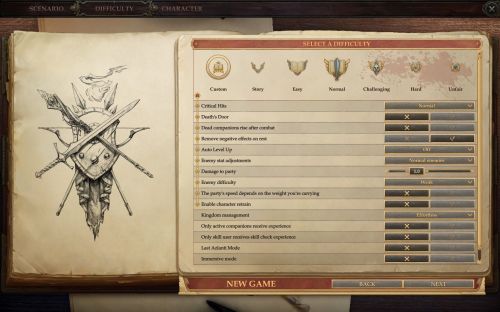
I set Enemy Difficulty to Weak because that's the closest enemy attributes get to the Rules As Written; Normal has them higher than what they should be.
All the skills receive plenty of use, and whenever you're in a dialogue screen or have every character highlighted, it always uses the character with the best score. Somewhat unique to this game is that passing a knowledge or a lore check on an enemy allows you to view some of or even all of its attributes and abilities; a fair compromise between being completely blind and having complete metaknowledge immediately. I was aggravated by the randomization involved with this and all the other skills at first, though I learned to live with it. As an example, when you fail at picking a lock, you can't ever try again with that particular character until the next level-up. Of course, nothing's stopping you from reloading until it works, but I couldn't be bothered for the most part and accepted my losses unless I only lost because of a pitifully low-digit roll. Pathfinder does support taking 10 and taking 20 on checks outside of combat, so I'm puzzled why they didn't go with that.
Moving on, the inventory system uses individual weight limits and a party stash that's limited by the strength scores of everyone in the party. Going over certain thresholds decreases the amount of time your characters have before they become fatigued, and it also slows down movement on the world map (as well as movement in general if you wish to opt into that). I found it a fair compromise between extreme inventory micromanagement and having an unlimited inventory that encourages vacuuming up everything.
With regard to inventory micromanagement, I like how there's a Jagged Alliance 2-esque screen showing all the loot you've passed by when you leave a map. If you want to gather as you go, there's a Pillars of Eternity-style loot radius as well. There's no ammo management, but you do eventually get to acquire magic arrows that replenish on rest that you can activate from your item belt. I wish highlight-all worked as a toggle I could just leave on all the time, but at least it keeps track of all the containers you have and haven't checked. Unfortunately, enemy corpses and the loot you don't take from them never go away, and this can bloat your save file size and save/load times by the time you've reached the end, sometimes even causing a crash while quicksaving (which is fortunately the only kind of bug I noticed in my playthrough). The Infinity Engine games had it right all along by having items on the ground disappear after enough time had passed.
As for the loot itself, it consists of your standard fare and a number of items with unique effects. I was particularly fond of the pendant that makes every memorized casting of haste and slow extended, the top hat that increases the individual's carry limit by 200 lbs, and the helmet that sends the wearer into a rage and summons two barbarian ghosts for two minutes. A low magic setting this is not; you'll be swimming in piles of magic loot.
The spells are also standard 3.5 fare; powerful effects restricted by how many can be cast in an adventuring day and their ability to overcome an opponent's saving throws. I mostly relied on pre-buffing like I typically do. Some require the use of diamond dust, a diamond, or dinosaur bones to cast. At first I was annoyed by this and would have preferred they use the gold equivalent instead, but scarcity isn't a big deal after a while.
There are some pathfinding issues during combat in the more cramped areas, but it feels smooth for the most part. With the exception of the animation delay at the start of each battle as your characters take out their weapons, everything feels quick and responsive. There are also attacks of opportunity, so you can't zip around the battlefield without consequence, though you can build characters to have a better chance of avoiding them. The flanking rules are different from tabletop in that positioning doesn't matter; if two characters attack another in melee, the character is flanked. I'm fine with the micromanagement-relief, though this rule does benefit the enemies as much as it can benefit you.
If a character does happen to fall, it's not necessarily a big deal; getting outright killed requires getting the negative equivalent of their constitution score. If you don't get someone to heal them during battle, they'll pop up again with a sliver of health after combat ends. One can also make this even more lenient by selecting the "Death's Door" (a debuff you get instead of dying, though if you die once more before resting, you're dead) and/or the "Dead Companions Rise After Combat" options, though I did not.
Resting outside your base is an involved process that requires assigning party members to certain tasks: five in total, though two members can be assigned to each one to boost the chances of success. It requires one ration per party member or hunting for food if you're outdoors, which can take an additional amount of time determined by a check. Someone can be assigned to pass a stealth check for camp camouflage to avoid random encounters. Another can be devoted to cooking to receive a long-term buff depending on the recipe. Each companion also has a special task they can work on, which is typically a self-buff. Finally, someone assigned to keep watch will be the first ready to fight if the rest is interrupted. Resting in this matter is also the only place where party banter happens. Overall, it's a pretty great way of making resting something to enjoy instead of a boring routine.
The latest patch released to coincide with the console ports includes a turn-based-combat toggle. I played Kingmaker to completion before this patch was released, so I can't speak for how well it's implemented, though it does seem like it'd be useful for the more demanding fights. I wouldn't play the entire game with it on for reasons I'll get to later in the review.
Controversial Features - Time Limits and Kingdom Management
First off, I'd like to say how much I hate how the title screen is animated in such a way that it slowly zooms in. Yes, you can still click the option you want before it zooms all the way in, but it's such a needless irritation to have to manage. It's strange how Owlcat has never included an option to disable it after all this time. People don't want animated menus that get in the way of what they want to do every single time; even DVD menu designers figured this out after over a decade.
Now, on to the subject of time limits. There's a potential problem with D&D and D&D-derived crpgs in that a player can use up their most powerful spells in a battle, rest or backtrack to a safe area to rest, and then repeat the process over again every time. Kingmaker addresses this through the use of camping supplies and a time limit on each chapter before your kingdom is destroyed by the current threat. A full party's worth of rations is 60 lbs and there are some areas where you won't be able to hunt or even backtrack to hunt, so given everything else you'll want to carry, you'll have to make some sacrifices somewhere. The time limits themselves are pretty generous as long as you're not resting after nearly ever fight or aimlessly wandering; I completed every optional area and nearly every sidequest and had plenty of time to spare, so I could have rested a lot more than I did (though my preference is to play as long as possible without doing so). I approve of this feature, especially since it also encourages you to extend your adventuring day by using all those potions, scrolls, and wands you collect in the world. A lot of people have the mindset to save consumables for later in case they should need them, and then later never comes. Unless you have one copy of something left, it's not worth saving; use it.
Kingdom management I'm more mixed about. I liked making dialogue decisions about the direction of my kingdom, as well as how it's something non-combat related to do during the lulls between threats to the kingdom. I didn't care for the execution; I don't like having to be a village/town/city planner, deciding where each individual building goes on a grid to get the most out of their kingdom statistic bonuses. I also don't care for the simple randomization-based means of conflict resolution in assigning an advisor to a task that takes a variable amount of days to finish. A puzzling aspect of this is that the roll isn't actually made until the day of completion, so one can reload until it succeeds if you fail. The time-keeping system uses Pathfinder's weird names for months; it helps that they put a number after each one, but it's not quite good enough since they don't explicitly tell you that it lines up with a real calendar. This is necessary because tasks expire, so you could end up missing out on an opportunity or taking a penalty from an unsolved problem if you're wrong about how many days you have left when your advisors are currently occupied. There's a calendar function hotkey listed in the options menu, but it doesn't work; a seemingly planned-but-abandoned feature. Finally, many of the options you can invest in come across as traps to me; you won't be able to recoup the investment on a good number of them, and many of the kingdom-wide party benefits you can purchase aren't worth it for territories you've already explored. The most useful aspects of the system are buying the upgrades that increase your world map traveling speed and buying teleportation circles for your settlements to cut back on travel time. Other than that, the only reason to engage with it is to bring your kingdom stats up in case you end up slacking on the kingdom-threatening quests and start taking penalties that will eventually result in a game over. If that's still too much for your tastes, you can set management to automatic, but it's my understanding that this setting doesn't make the best decisions; like it or not, managing the kingdom yourself is an intended part of the experience.
Art and Sound
Kingmaker's art is faithful to Pathfinder's established art style, which is cartoonishly stylized with vivid colors. A lot of fantasy RPG fans hate this style and prefer the opposite, but not me; I think it looks great. The user interface is also appropriately fantasy-themed, scrolls and magic accessories are properly color-coded, and the character portraits are mostly high in quality, though too few for my liking. I'm bothered by how they locked several additional portraits behind a higher-priced version of the game; I wasn't aware of this when I bought it, so I had to make my own small and medium-sized portraits from a full-sized version of the one I wanted that had been helpfully uploaded on the internet. Furthermore, the portrait artist has a big problem with drawing feet correctly, though at least this isn't a problem one will notice for most of the game.
Another minus is that spell effects are the glowy, flashy type which makes characters difficult to comprehend during combat. It seems as though no modern developer making real-time-with-pause RPGs is interested in replicating the style of the Infinity Engine games by keeping visual effects minimalist; whether by accident or intention, it resulted in easier-to-read battles.
The music and sound effects are typical of the genre; a bombastic title theme, soothing world map music (both provided by Inon Zur), and the usual blur of ambient exploration and frenetic battles. Zur aside, Sergey Eybog wrote the dramatic pieces I remember best. My favorite track of his is Skylark, which plays during pivotal moments with your party members. As for sound effects, they sounded like how I expected, so no complaints there.
I found the voice acting mostly pleasant. There were a few weak performances (Kressle's in particular struck me as bad; fortunately she's just a minor non-playable character), but the quality overall is high. My favorite performance came from the primary antagonist; the voice felt perfect for the character, on the level of David Warner as Irenicus from Baldur's Gate II. I'm glad they stuck to partial voice acting in this era of pseudo-isometric cRPGs going for full VA since going down that path results in hearing more weaker performances by necessity.
Story and Role-playing
Pathfinder's setting feels a lot like the Forgotten Realms with a few details changed; a good deal of this information is conveyed through lengthy exposition dumps in dialogue, as is unfortunately typical for this genre. Perhaps one day someone will have the confidence to write a pseudo-isometric fantasy RPG where the details are explained only through context. Regardless, what's important is that it's familiar in all the ways that many traditional fantasy fans like, and it retains that sense of excitement and optimism in a world where brutal things happen to its inhabitants.
Kingmaker has a colorful cast of over-the-top characters, just the way most fantasy fans like them. I liked some and disliked others, but never because I thought they were poorly written. For example, at first I thought Linzi was a writer's pet; she's one of the companions with plot armor because she's the narrator and all the journal entries are written from her perspective. However, they had a particular story in mind with her, and I was impressed with the outcome. This is a recurring theme; if you initially hate a character, see their story arcs out till the end and chances are good you'll either change your mind or get some catharsis from how things turn out.
The plot strikes a good balance between the personal stakes of a long-running conflict that's seeded throughout the game and the standard adventuring of the first five chapters' individual conflicts. There are a good number of twists and turns I enjoyed going through that I won't be detailing, since I believe the story works best going in as blind as possible. All I'll say is that the recurring themes involve curses, solving mysteries, and the past catching up to other characters. Fans of predefined protagonists won't like how the player character is a blank slate with no prior relationships to anyone in the game, but that's by necessity, given that this campaign was created for tabletop role-playing. Despite that, there are a few sections where I was unhappy with the range of dialogue choices available, finding that none of them fit the character I wanted to play.
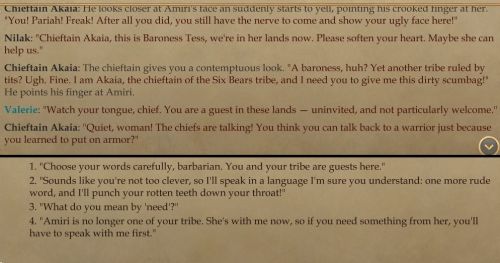
However, this wasn't one of them. Props to Owlcat for allowing me to respond to rudeness with neutrality, unlike a certain infamous Baldur's Gate expansion.
Each chapter has a decent amount of narrative and gameplay-affecting reactivity. It's not extremely ambitious, but there's enough to make each playthrough feel like yours. Examples include your actions in the prologue determining your starting companions, decisions that result in beneficial NPCs living or dying, convincing certain enemies and neutral characters throughout the game into becoming your allies, initiating fights with those who would depart without one, bypassing fights, and sometimes not being able to bypass a fight; during one encounter, I succeeded in bluffing my way past some bandits, but the lawful good Valerie wouldn't have it. There's also yet another fantasy RPG trial where the outcome determines how many people you have to fight, which is admittedly a bit better than the outcomes of the trials featured in Neverwinter Nights 2 and Pillars of Eternity, though only on par with the Landsmeet in Dragon Age: Origins. Lastly, there's a pleasantly large amount of ending slides to go through at the end.
It's not perfect though. There's a section in chapter three where I was railroaded into walking into a bad situation. There are these mysterious characters clearly up to no good who keep asking for your name and you have the option of not giving it them, which I took, since a conversation with the DLC companion, the loading screen tooltips, and my metaknowledge of D&D-style magic let me know that names give one power over another. Unfortunately, they find out your name anyway. To add insult to injury, one character then starts asking for the names of your companions, and even if you refuse to answer, the dummies blurt them out on their own anyway. The only alleviation is that the DLC companion uses an alias, so if you give the character that false name, you have one less problem to deal with later. What's particularly aggravating about this situation is that it led me on into believing I had a choice that I didn't actually have; I would have preferred having the rug pulled out from under me after only being asked for my name once. At least this was the only time I was frustrated by railroading.
Questing
Kingmaker has a gated open structure; you're able to explore anywhere you want in a certain region, but there are various plot gates that keep you from entering other higher level regions until another chapter unlocks them. I'm not one for high risk, high reward sequence breaking, so I don't mind. As for the main quest, it has to be followed in a step by step manner, though sometimes you'll be able to unlock a new area early if your perception is high enough. Even with these limits, choosing a direction to go in without knowing where the path will take you or what new locations will pop up really helps sell the idea that you're taming an untamed land.
Moreover, one novel aspect of the campaign is that once you've been given your barony, the NPCs come to you with their problems rather than the opposite. Sure, there are some sidequests to pick up while exploring the world, but for the most part, you'll be given the details of your quests from your throne room. A potential downside for some is that this means there is no part where you explore a big city looking for errands to run for random citizens, which is an expectation many fantasy RPG fans have; this would be inappropriate for someone of your character's station. It's eccentric enough to go around solving your people's issues personally, which some NPCs do observe with amusement.
I hope you like combat because Kingmaker has a ton of it. Too much in fact; combat areas on the critical path regularly have 10-12 encounters per map which feels like twice as much as there should be, especially since several areas contain multiple maps. In an interview conducted with us before his cognitive decline, Obsidian's Josh Sawyer said "Sometimes as a designer, when you look at a screen, and you realize like 'Wow, there's nothing there, oh I gotta put something there,' but it's okay. Or maybe that thing that you put there is like a container, or it's something to harvest, or just a little thing. The important thing is that it changes; it can't just be a fight, a screen, and a fight," which is advice Owlcat really ought to take.
Even if there are too many battles, I do like the pacing of combat difficulty for the most part, which consists of a mix of easy to medium and easy to hard battles on every map. Nearly every optional area has just a single encounter of medium or hard difficulty for its intended level, which is a welcome relief from the main quest, though the small number of maps available and the constant recycling of them will become quickly apparent. There are a few optional areas which contain something more substantial; I didn't care for the dungeon where you're locked in and have to kill skeletons over and over again until you're let out, but I loved the area where you climb a mountain to a fortress to kill a giant bird and take its egg (to deliver to an innkeeper or to keep for a one-use-only long-term buff recipe that will give you +3 to attack, damage, skill checks, and saving throws).
There are a handful of quests without combat at all, which is another welcome relief. The most memorable of these involve throwing a party for a sad companion, participating in some other-worldly debates, and competing in a series of contests at a festival. I enjoyed the comedic writing in all of them. Some areas have optional and mandatory puzzles to solve; I have a mixed opinion on these, though my favorite involved a dungeon in chapter three where you have to leave companions behind to press switches to open and close doors. There are also quite a number of well-done illustrated text adventures, which have seemingly become a standard feature in pseudo-isometric fantasy RPGs much to my approval.
When it comes to consistency, Kingmaker is a mix of fun and frustrating. I found the first two chapters a near-relentless grind with enough good parts to keep me going. While I hated the railroading in chapter three, it did ease up a bit. Chapter four was my favorite; unsurprisingly, it's also the shortest. I also loved chapter five up until the final combat area which is a grind of 18 combat encounters in a single map, with half of them tuned to make you give your all. Chapter six eases back a bit, while keeping the difficulty (Mandragora swarms are the cazadores of Kingmaker; I'll let you discover how for yourself). I'm grateful that most of the combat encounters in the final dungeon are off the critical path, so I only had to fight around ten, which may seem like a lot, but the dungeon is three maps with two world states each for a total of six with far more to kill than that. It's my understanding that Owlcat reconfigured the encounters in response to feedback, so props to them. There's even an optional bonus chapter after that depending on a decision you can make, but I didn't play it because I was completely satisfied with the ending I received thanks to my earlier actions; moreover, after 112 hours, I had more than enough, especially after glancing at the massively debuffed conditions you're expected to play under. I'll leave it to the powergamers.
Conclusion
Flawed as it may be, Kingmaker is high enough in quality when it comes to core gameplay and content. My congratulations to Owlcat for making a rough diamond on their first try after many months of patches. While it has too many issues to be an indisputable classic, this is the game Neverwinter Nights 2 should have been, and the one Pillars of Eternity failed to be (even though PoE has better combat pacing even with all its encounters). It's too bad it goes overboard on combat to such a degree that it's the equivalent of two RPGs in one; I never want to play it again even though I'd normally want to try a different build and make different choices. Nevertheless, it's a must-play for any real-time-with-pause party-based fantasy RPG fan.
Pathfinder: Kingmaker is Owlcat Games's Baldur's Gate-style adaptation of Paizo's Adventure Path series for the Pathfinder tabletop role-playing game. The premise is that your character is an adventurer who will be awarded with a barony (which will eventually become a kingdom) for defeating the bandits occupying the land, and then dealing with all the troubles that follow. It was released in late 2018 in an incredibly buggy state, resulting in a mixed reception. However, Owlcat has spent the past two years patching it, so the game as it is after all that additional effort deserves its own assessment.
Systems
Kingmaker uses the Pathfinder ruleset, which builds off of Dungeons & Dragons 3.5. I found it mostly familiar, though it does add a lot of different active abilities that I found overwhelming to have to read through, so I largely ignored them and made it through well enough. Classes new to D&D-derived crpgs include bomb-throwing alchemists, fighter/wizard-hybrid magi, fighter/cleric-hybrid inquisitors, ranger/rogue-hybrid slayers, and elemental-blast slinging kineticists (available as worthwhile downloadable content). For powergamers, it's a dream; there are a lot of different ways to build an incredibly effective character.
The difficulty settings have an impressive amount of customization, allowing players of all skill levels to find the ones that appeal to them. I had to go with custom settings myself since none of the preset options worked for me as-is; I made it as close as possible to the core rules with the exception of a few convenience tweaks to suit my personal preferences.

I set Enemy Difficulty to Weak because that's the closest enemy attributes get to the Rules As Written; Normal has them higher than what they should be.
All the skills receive plenty of use, and whenever you're in a dialogue screen or have every character highlighted, it always uses the character with the best score. Somewhat unique to this game is that passing a knowledge or a lore check on an enemy allows you to view some of or even all of its attributes and abilities; a fair compromise between being completely blind and having complete metaknowledge immediately. I was aggravated by the randomization involved with this and all the other skills at first, though I learned to live with it. As an example, when you fail at picking a lock, you can't ever try again with that particular character until the next level-up. Of course, nothing's stopping you from reloading until it works, but I couldn't be bothered for the most part and accepted my losses unless I only lost because of a pitifully low-digit roll. Pathfinder does support taking 10 and taking 20 on checks outside of combat, so I'm puzzled why they didn't go with that.
Moving on, the inventory system uses individual weight limits and a party stash that's limited by the strength scores of everyone in the party. Going over certain thresholds decreases the amount of time your characters have before they become fatigued, and it also slows down movement on the world map (as well as movement in general if you wish to opt into that). I found it a fair compromise between extreme inventory micromanagement and having an unlimited inventory that encourages vacuuming up everything.
With regard to inventory micromanagement, I like how there's a Jagged Alliance 2-esque screen showing all the loot you've passed by when you leave a map. If you want to gather as you go, there's a Pillars of Eternity-style loot radius as well. There's no ammo management, but you do eventually get to acquire magic arrows that replenish on rest that you can activate from your item belt. I wish highlight-all worked as a toggle I could just leave on all the time, but at least it keeps track of all the containers you have and haven't checked. Unfortunately, enemy corpses and the loot you don't take from them never go away, and this can bloat your save file size and save/load times by the time you've reached the end, sometimes even causing a crash while quicksaving (which is fortunately the only kind of bug I noticed in my playthrough). The Infinity Engine games had it right all along by having items on the ground disappear after enough time had passed.
As for the loot itself, it consists of your standard fare and a number of items with unique effects. I was particularly fond of the pendant that makes every memorized casting of haste and slow extended, the top hat that increases the individual's carry limit by 200 lbs, and the helmet that sends the wearer into a rage and summons two barbarian ghosts for two minutes. A low magic setting this is not; you'll be swimming in piles of magic loot.
The spells are also standard 3.5 fare; powerful effects restricted by how many can be cast in an adventuring day and their ability to overcome an opponent's saving throws. I mostly relied on pre-buffing like I typically do. Some require the use of diamond dust, a diamond, or dinosaur bones to cast. At first I was annoyed by this and would have preferred they use the gold equivalent instead, but scarcity isn't a big deal after a while.
There are some pathfinding issues during combat in the more cramped areas, but it feels smooth for the most part. With the exception of the animation delay at the start of each battle as your characters take out their weapons, everything feels quick and responsive. There are also attacks of opportunity, so you can't zip around the battlefield without consequence, though you can build characters to have a better chance of avoiding them. The flanking rules are different from tabletop in that positioning doesn't matter; if two characters attack another in melee, the character is flanked. I'm fine with the micromanagement-relief, though this rule does benefit the enemies as much as it can benefit you.
If a character does happen to fall, it's not necessarily a big deal; getting outright killed requires getting the negative equivalent of their constitution score. If you don't get someone to heal them during battle, they'll pop up again with a sliver of health after combat ends. One can also make this even more lenient by selecting the "Death's Door" (a debuff you get instead of dying, though if you die once more before resting, you're dead) and/or the "Dead Companions Rise After Combat" options, though I did not.
Resting outside your base is an involved process that requires assigning party members to certain tasks: five in total, though two members can be assigned to each one to boost the chances of success. It requires one ration per party member or hunting for food if you're outdoors, which can take an additional amount of time determined by a check. Someone can be assigned to pass a stealth check for camp camouflage to avoid random encounters. Another can be devoted to cooking to receive a long-term buff depending on the recipe. Each companion also has a special task they can work on, which is typically a self-buff. Finally, someone assigned to keep watch will be the first ready to fight if the rest is interrupted. Resting in this matter is also the only place where party banter happens. Overall, it's a pretty great way of making resting something to enjoy instead of a boring routine.
The latest patch released to coincide with the console ports includes a turn-based-combat toggle. I played Kingmaker to completion before this patch was released, so I can't speak for how well it's implemented, though it does seem like it'd be useful for the more demanding fights. I wouldn't play the entire game with it on for reasons I'll get to later in the review.
Controversial Features - Time Limits and Kingdom Management
First off, I'd like to say how much I hate how the title screen is animated in such a way that it slowly zooms in. Yes, you can still click the option you want before it zooms all the way in, but it's such a needless irritation to have to manage. It's strange how Owlcat has never included an option to disable it after all this time. People don't want animated menus that get in the way of what they want to do every single time; even DVD menu designers figured this out after over a decade.
Now, on to the subject of time limits. There's a potential problem with D&D and D&D-derived crpgs in that a player can use up their most powerful spells in a battle, rest or backtrack to a safe area to rest, and then repeat the process over again every time. Kingmaker addresses this through the use of camping supplies and a time limit on each chapter before your kingdom is destroyed by the current threat. A full party's worth of rations is 60 lbs and there are some areas where you won't be able to hunt or even backtrack to hunt, so given everything else you'll want to carry, you'll have to make some sacrifices somewhere. The time limits themselves are pretty generous as long as you're not resting after nearly ever fight or aimlessly wandering; I completed every optional area and nearly every sidequest and had plenty of time to spare, so I could have rested a lot more than I did (though my preference is to play as long as possible without doing so). I approve of this feature, especially since it also encourages you to extend your adventuring day by using all those potions, scrolls, and wands you collect in the world. A lot of people have the mindset to save consumables for later in case they should need them, and then later never comes. Unless you have one copy of something left, it's not worth saving; use it.
Kingdom management I'm more mixed about. I liked making dialogue decisions about the direction of my kingdom, as well as how it's something non-combat related to do during the lulls between threats to the kingdom. I didn't care for the execution; I don't like having to be a village/town/city planner, deciding where each individual building goes on a grid to get the most out of their kingdom statistic bonuses. I also don't care for the simple randomization-based means of conflict resolution in assigning an advisor to a task that takes a variable amount of days to finish. A puzzling aspect of this is that the roll isn't actually made until the day of completion, so one can reload until it succeeds if you fail. The time-keeping system uses Pathfinder's weird names for months; it helps that they put a number after each one, but it's not quite good enough since they don't explicitly tell you that it lines up with a real calendar. This is necessary because tasks expire, so you could end up missing out on an opportunity or taking a penalty from an unsolved problem if you're wrong about how many days you have left when your advisors are currently occupied. There's a calendar function hotkey listed in the options menu, but it doesn't work; a seemingly planned-but-abandoned feature. Finally, many of the options you can invest in come across as traps to me; you won't be able to recoup the investment on a good number of them, and many of the kingdom-wide party benefits you can purchase aren't worth it for territories you've already explored. The most useful aspects of the system are buying the upgrades that increase your world map traveling speed and buying teleportation circles for your settlements to cut back on travel time. Other than that, the only reason to engage with it is to bring your kingdom stats up in case you end up slacking on the kingdom-threatening quests and start taking penalties that will eventually result in a game over. If that's still too much for your tastes, you can set management to automatic, but it's my understanding that this setting doesn't make the best decisions; like it or not, managing the kingdom yourself is an intended part of the experience.
Art and Sound
Kingmaker's art is faithful to Pathfinder's established art style, which is cartoonishly stylized with vivid colors. A lot of fantasy RPG fans hate this style and prefer the opposite, but not me; I think it looks great. The user interface is also appropriately fantasy-themed, scrolls and magic accessories are properly color-coded, and the character portraits are mostly high in quality, though too few for my liking. I'm bothered by how they locked several additional portraits behind a higher-priced version of the game; I wasn't aware of this when I bought it, so I had to make my own small and medium-sized portraits from a full-sized version of the one I wanted that had been helpfully uploaded on the internet. Furthermore, the portrait artist has a big problem with drawing feet correctly, though at least this isn't a problem one will notice for most of the game.
Another minus is that spell effects are the glowy, flashy type which makes characters difficult to comprehend during combat. It seems as though no modern developer making real-time-with-pause RPGs is interested in replicating the style of the Infinity Engine games by keeping visual effects minimalist; whether by accident or intention, it resulted in easier-to-read battles.
The music and sound effects are typical of the genre; a bombastic title theme, soothing world map music (both provided by Inon Zur), and the usual blur of ambient exploration and frenetic battles. Zur aside, Sergey Eybog wrote the dramatic pieces I remember best. My favorite track of his is Skylark, which plays during pivotal moments with your party members. As for sound effects, they sounded like how I expected, so no complaints there.
I found the voice acting mostly pleasant. There were a few weak performances (Kressle's in particular struck me as bad; fortunately she's just a minor non-playable character), but the quality overall is high. My favorite performance came from the primary antagonist; the voice felt perfect for the character, on the level of David Warner as Irenicus from Baldur's Gate II. I'm glad they stuck to partial voice acting in this era of pseudo-isometric cRPGs going for full VA since going down that path results in hearing more weaker performances by necessity.
Story and Role-playing
Pathfinder's setting feels a lot like the Forgotten Realms with a few details changed; a good deal of this information is conveyed through lengthy exposition dumps in dialogue, as is unfortunately typical for this genre. Perhaps one day someone will have the confidence to write a pseudo-isometric fantasy RPG where the details are explained only through context. Regardless, what's important is that it's familiar in all the ways that many traditional fantasy fans like, and it retains that sense of excitement and optimism in a world where brutal things happen to its inhabitants.
Kingmaker has a colorful cast of over-the-top characters, just the way most fantasy fans like them. I liked some and disliked others, but never because I thought they were poorly written. For example, at first I thought Linzi was a writer's pet; she's one of the companions with plot armor because she's the narrator and all the journal entries are written from her perspective. However, they had a particular story in mind with her, and I was impressed with the outcome. This is a recurring theme; if you initially hate a character, see their story arcs out till the end and chances are good you'll either change your mind or get some catharsis from how things turn out.
The plot strikes a good balance between the personal stakes of a long-running conflict that's seeded throughout the game and the standard adventuring of the first five chapters' individual conflicts. There are a good number of twists and turns I enjoyed going through that I won't be detailing, since I believe the story works best going in as blind as possible. All I'll say is that the recurring themes involve curses, solving mysteries, and the past catching up to other characters. Fans of predefined protagonists won't like how the player character is a blank slate with no prior relationships to anyone in the game, but that's by necessity, given that this campaign was created for tabletop role-playing. Despite that, there are a few sections where I was unhappy with the range of dialogue choices available, finding that none of them fit the character I wanted to play.

However, this wasn't one of them. Props to Owlcat for allowing me to respond to rudeness with neutrality, unlike a certain infamous Baldur's Gate expansion.
Each chapter has a decent amount of narrative and gameplay-affecting reactivity. It's not extremely ambitious, but there's enough to make each playthrough feel like yours. Examples include your actions in the prologue determining your starting companions, decisions that result in beneficial NPCs living or dying, convincing certain enemies and neutral characters throughout the game into becoming your allies, initiating fights with those who would depart without one, bypassing fights, and sometimes not being able to bypass a fight; during one encounter, I succeeded in bluffing my way past some bandits, but the lawful good Valerie wouldn't have it. There's also yet another fantasy RPG trial where the outcome determines how many people you have to fight, which is admittedly a bit better than the outcomes of the trials featured in Neverwinter Nights 2 and Pillars of Eternity, though only on par with the Landsmeet in Dragon Age: Origins. Lastly, there's a pleasantly large amount of ending slides to go through at the end.
It's not perfect though. There's a section in chapter three where I was railroaded into walking into a bad situation. There are these mysterious characters clearly up to no good who keep asking for your name and you have the option of not giving it them, which I took, since a conversation with the DLC companion, the loading screen tooltips, and my metaknowledge of D&D-style magic let me know that names give one power over another. Unfortunately, they find out your name anyway. To add insult to injury, one character then starts asking for the names of your companions, and even if you refuse to answer, the dummies blurt them out on their own anyway. The only alleviation is that the DLC companion uses an alias, so if you give the character that false name, you have one less problem to deal with later. What's particularly aggravating about this situation is that it led me on into believing I had a choice that I didn't actually have; I would have preferred having the rug pulled out from under me after only being asked for my name once. At least this was the only time I was frustrated by railroading.
Questing
Kingmaker has a gated open structure; you're able to explore anywhere you want in a certain region, but there are various plot gates that keep you from entering other higher level regions until another chapter unlocks them. I'm not one for high risk, high reward sequence breaking, so I don't mind. As for the main quest, it has to be followed in a step by step manner, though sometimes you'll be able to unlock a new area early if your perception is high enough. Even with these limits, choosing a direction to go in without knowing where the path will take you or what new locations will pop up really helps sell the idea that you're taming an untamed land.
Moreover, one novel aspect of the campaign is that once you've been given your barony, the NPCs come to you with their problems rather than the opposite. Sure, there are some sidequests to pick up while exploring the world, but for the most part, you'll be given the details of your quests from your throne room. A potential downside for some is that this means there is no part where you explore a big city looking for errands to run for random citizens, which is an expectation many fantasy RPG fans have; this would be inappropriate for someone of your character's station. It's eccentric enough to go around solving your people's issues personally, which some NPCs do observe with amusement.
I hope you like combat because Kingmaker has a ton of it. Too much in fact; combat areas on the critical path regularly have 10-12 encounters per map which feels like twice as much as there should be, especially since several areas contain multiple maps. In an interview conducted with us before his cognitive decline, Obsidian's Josh Sawyer said "Sometimes as a designer, when you look at a screen, and you realize like 'Wow, there's nothing there, oh I gotta put something there,' but it's okay. Or maybe that thing that you put there is like a container, or it's something to harvest, or just a little thing. The important thing is that it changes; it can't just be a fight, a screen, and a fight," which is advice Owlcat really ought to take.
Even if there are too many battles, I do like the pacing of combat difficulty for the most part, which consists of a mix of easy to medium and easy to hard battles on every map. Nearly every optional area has just a single encounter of medium or hard difficulty for its intended level, which is a welcome relief from the main quest, though the small number of maps available and the constant recycling of them will become quickly apparent. There are a few optional areas which contain something more substantial; I didn't care for the dungeon where you're locked in and have to kill skeletons over and over again until you're let out, but I loved the area where you climb a mountain to a fortress to kill a giant bird and take its egg (to deliver to an innkeeper or to keep for a one-use-only long-term buff recipe that will give you +3 to attack, damage, skill checks, and saving throws).
There are a handful of quests without combat at all, which is another welcome relief. The most memorable of these involve throwing a party for a sad companion, participating in some other-worldly debates, and competing in a series of contests at a festival. I enjoyed the comedic writing in all of them. Some areas have optional and mandatory puzzles to solve; I have a mixed opinion on these, though my favorite involved a dungeon in chapter three where you have to leave companions behind to press switches to open and close doors. There are also quite a number of well-done illustrated text adventures, which have seemingly become a standard feature in pseudo-isometric fantasy RPGs much to my approval.
When it comes to consistency, Kingmaker is a mix of fun and frustrating. I found the first two chapters a near-relentless grind with enough good parts to keep me going. While I hated the railroading in chapter three, it did ease up a bit. Chapter four was my favorite; unsurprisingly, it's also the shortest. I also loved chapter five up until the final combat area which is a grind of 18 combat encounters in a single map, with half of them tuned to make you give your all. Chapter six eases back a bit, while keeping the difficulty (Mandragora swarms are the cazadores of Kingmaker; I'll let you discover how for yourself). I'm grateful that most of the combat encounters in the final dungeon are off the critical path, so I only had to fight around ten, which may seem like a lot, but the dungeon is three maps with two world states each for a total of six with far more to kill than that. It's my understanding that Owlcat reconfigured the encounters in response to feedback, so props to them. There's even an optional bonus chapter after that depending on a decision you can make, but I didn't play it because I was completely satisfied with the ending I received thanks to my earlier actions; moreover, after 112 hours, I had more than enough, especially after glancing at the massively debuffed conditions you're expected to play under. I'll leave it to the powergamers.
Conclusion
Flawed as it may be, Kingmaker is high enough in quality when it comes to core gameplay and content. My congratulations to Owlcat for making a rough diamond on their first try after many months of patches. While it has too many issues to be an indisputable classic, this is the game Neverwinter Nights 2 should have been, and the one Pillars of Eternity failed to be (even though PoE has better combat pacing even with all its encounters). It's too bad it goes overboard on combat to such a degree that it's the equivalent of two RPGs in one; I never want to play it again even though I'd normally want to try a different build and make different choices. Nevertheless, it's a must-play for any real-time-with-pause party-based fantasy RPG fan.
There are 237 comments on RPG Codex Review: Pathfinder Kingmaker





